-
 Bitcoin
Bitcoin $106,754.6083
1.33% -
 Ethereum
Ethereum $2,625.8249
3.80% -
 Tether USDt
Tether USDt $1.0001
-0.03% -
 XRP
XRP $2.1891
1.67% -
 BNB
BNB $654.5220
0.66% -
 Solana
Solana $156.9428
7.28% -
 USDC
USDC $0.9998
0.00% -
 Dogecoin
Dogecoin $0.1780
1.14% -
 TRON
TRON $0.2706
-0.16% -
 Cardano
Cardano $0.6470
2.77% -
 Hyperliquid
Hyperliquid $44.6467
10.24% -
 Sui
Sui $3.1128
3.86% -
 Bitcoin Cash
Bitcoin Cash $455.7646
3.00% -
 Chainlink
Chainlink $13.6858
4.08% -
 UNUS SED LEO
UNUS SED LEO $9.2682
0.21% -
 Avalanche
Avalanche $19.7433
3.79% -
 Stellar
Stellar $0.2616
1.64% -
 Toncoin
Toncoin $3.0222
2.19% -
 Shiba Inu
Shiba Inu $0.0...01220
1.49% -
 Hedera
Hedera $0.1580
2.75% -
 Litecoin
Litecoin $87.4964
2.29% -
 Polkadot
Polkadot $3.8958
3.05% -
 Ethena USDe
Ethena USDe $1.0000
-0.04% -
 Monero
Monero $317.2263
0.26% -
 Bitget Token
Bitget Token $4.5985
1.68% -
 Dai
Dai $0.9999
0.00% -
 Pepe
Pepe $0.0...01140
2.44% -
 Uniswap
Uniswap $7.6065
5.29% -
 Pi
Pi $0.6042
-2.00% -
 Aave
Aave $289.6343
6.02%
How to choose different blockchain networks when generating a Bitcoin wallet address?
Bitcoin wallet addresses are intrinsically linked to the Bitcoin blockchain; choosing a different network is impossible. Wallet providers offer various interfaces (software, hardware), but the underlying blockchain remains Bitcoin's.
Mar 11, 2025 at 09:26 pm
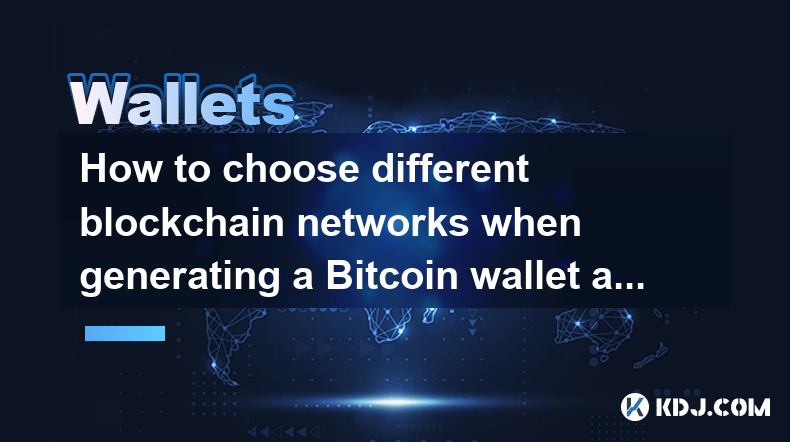
Key Points:
- Bitcoin wallet addresses are not tied to a specific blockchain network. Bitcoin operates solely on its own blockchain.
- The concept of "choosing a blockchain network" when generating a Bitcoin wallet address is fundamentally incorrect.
- Understanding the difference between Bitcoin and other cryptocurrencies is crucial to avoid confusion.
- Wallet providers, not blockchains, determine the type of wallet (e.g., software, hardware).
- Security considerations remain paramount regardless of the wallet type.
How to Choose Different Blockchain Networks When Generating a Bitcoin Wallet Address?
The question itself contains a misconception. Bitcoin operates on its own unique blockchain network, separate and distinct from other cryptocurrencies like Ethereum, Solana, or Cardano. Therefore, you don't "choose" a blockchain network when generating a Bitcoin wallet address. A Bitcoin address is inherently tied to the Bitcoin blockchain. Attempting to select a different blockchain would result in an invalid address and inability to receive or send Bitcoin.
The confusion might arise from the variety of wallet providers and the different types of wallets available. These wallets, however, are simply interfaces for interacting with the Bitcoin blockchain, not alternative blockchains themselves. You might use a software wallet on your phone, a hardware wallet for enhanced security, or a web wallet offered by an exchange. These choices affect user experience and security, but not the underlying blockchain.
Understanding the differences between Bitcoin and other cryptocurrencies is essential. Bitcoin's blockchain is designed for its specific purposes, with unique transaction validation mechanisms and a limited supply. Other cryptocurrencies have their own blockchains, each with varying functionalities, consensus mechanisms, and tokenomics. Trying to generate a Bitcoin address on, for example, the Ethereum network, is akin to trying to use a car key to open a house door—it simply won't work.
Let's clarify the process of generating a Bitcoin wallet address. The process usually involves:
- Choosing a Wallet Provider: This could be a reputable exchange like Coinbase or Kraken, a software wallet like Electrum or Exodus, or a hardware wallet like Ledger or Trezor. The choice depends on your security needs and technical proficiency.
- Setting up the Wallet: This typically involves creating a strong password and securely storing your seed phrase (a list of words that acts as a backup for your wallet). Never share your seed phrase with anyone.
- Generating Addresses: Once the wallet is set up, it automatically generates one or more Bitcoin addresses. These addresses are used to receive Bitcoin. Each address is unique and associated with the Bitcoin blockchain.
Security remains a crucial aspect, regardless of your chosen wallet type.
- Use strong passwords: Avoid easily guessable passwords and use a password manager.
- Securely store your seed phrase: Write it down on paper, store it in a safe place, and consider using a hardware security device.
- Be wary of phishing scams: Never share your private keys or seed phrase with anyone.
- Keep your software updated: Regularly update your wallet software to patch security vulnerabilities.
The concept of selecting a blockchain network is only relevant when dealing with other cryptocurrencies. If you want to interact with Ethereum, you need an Ethereum wallet; for Solana, you need a Solana wallet, and so on. Each cryptocurrency has its own distinct blockchain and requires the appropriate wallet to interact with it. Sticking to a reputable wallet provider for Bitcoin will ensure you are interacting with the correct blockchain. The Bitcoin network itself doesn't offer a selection of blockchains during address generation.
Frequently Asked Questions:
Q: Can I use a Bitcoin wallet address on another blockchain?
A: No. A Bitcoin address is only valid on the Bitcoin blockchain. Using it on another blockchain will result in a transaction failure.
Q: What if I want to send Bitcoin to an Ethereum address?
A: You can't. Bitcoin and Ethereum operate on separate blockchains, and their addresses are incompatible.
Q: Does the type of wallet I use change the blockchain?
A: No. The wallet is simply an interface for interacting with the Bitcoin blockchain. The blockchain remains the same regardless of the wallet type (software, hardware, web).
Q: How many Bitcoin addresses can I generate?
A: Most wallets allow you to generate multiple Bitcoin addresses. This enhances privacy and security by avoiding the reuse of addresses.
Q: Are all Bitcoin wallet addresses created equal in terms of security?
A: While all Bitcoin addresses are theoretically equally secure on the Bitcoin blockchain, the security of your wallet depends largely on the security practices you employ (e.g., strong passwords, secure seed phrase storage). A hardware wallet generally provides a higher level of security than a software wallet.
Disclaimer:info@kdj.com
The information provided is not trading advice. kdj.com does not assume any responsibility for any investments made based on the information provided in this article. Cryptocurrencies are highly volatile and it is highly recommended that you invest with caution after thorough research!
If you believe that the content used on this website infringes your copyright, please contact us immediately (info@kdj.com) and we will delete it promptly.
- 2025-W Uncirculated American Gold Eagle and Dr. Vera Rubin Quarter Mark New Products
- 2025-06-13 06:25:13
- Ruvi AI (RVU) Leverages Blockchain and Artificial Intelligence to Disrupt Marketing, Entertainment, and Finance
- 2025-06-13 07:05:12
- H100 Group AB Raises 101 Million SEK (Approximately $10.6 Million) to Bolster Bitcoin Reserves
- 2025-06-13 06:25:13
- Galaxy Digital CEO Mike Novogratz Says Bitcoin Will Replace Gold and Go to $1,000,000
- 2025-06-13 06:45:13
- Trust Wallet Token (TWT) Price Drops 5.7% as RWA Integration Plans Ignite Excitement
- 2025-06-13 06:45:13
- Ethereum (ETH) Is in the Second Phase of a Three-Stage Market Cycle
- 2025-06-13 07:25:13
Related knowledge
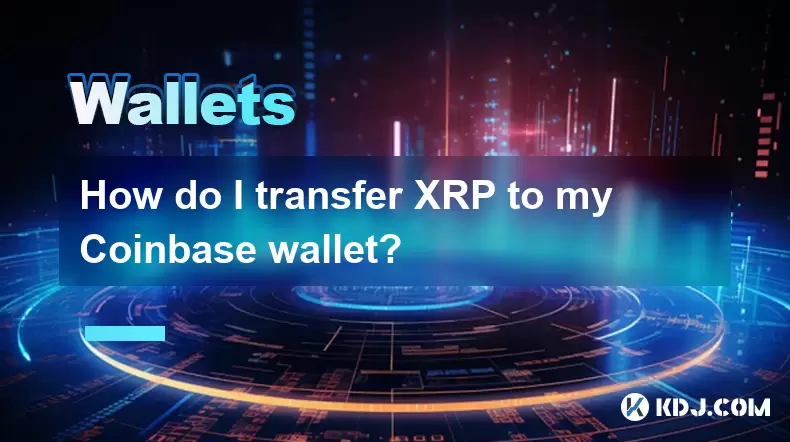
How do I transfer XRP to my Coinbase wallet?
Jun 16,2025 at 04:57pm
Understanding the Basics of XRP and Coinbase CompatibilityBefore initiating any transfer, it’s essential to confirm whether Coinbase supports XRP. As of recent updates, Coinbase has resumed offering XRP trading services on its platform after a period of uncertainty due to legal issues involving Ripple Labs. However, availability may vary depending on yo...

How do I deposit BNB into my Trust Wallet?
Jun 15,2025 at 03:56pm
Understanding BNB and Trust Wallet CompatibilityBefore initiating a deposit, it’s crucial to understand what BNB is and how it interacts with Trust Wallet. BNB (Binance Coin) is a utility token created by the Binance exchange. It can be used for paying transaction fees, participating in token sales, and more. Trust Wallet, on the other hand, is a mobile...
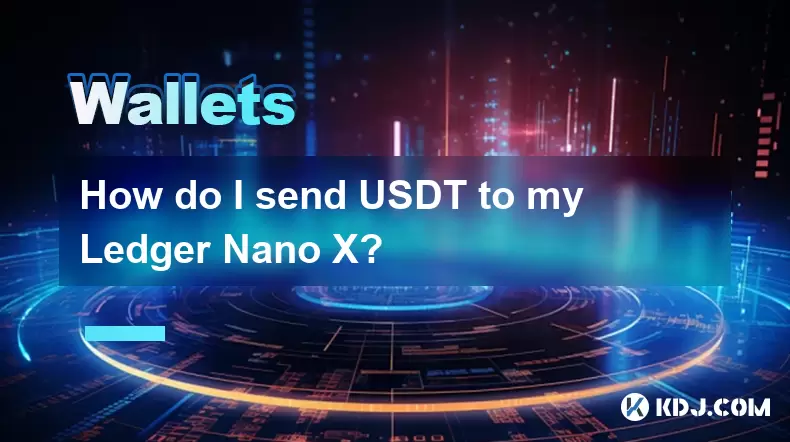
How do I send USDT to my Ledger Nano X?
Jun 15,2025 at 06:28am
What is USDT and Why Use Ledger Nano X?USDT, also known as Tether, is one of the most widely used stablecoins in the cryptocurrency ecosystem. It operates on various blockchain networks such as Ethereum (ERC-20), Tron (TRC-20), and others, offering users a digital asset pegged 1:1 to the US dollar. When it comes to storing USDT securely, hardware wallet...
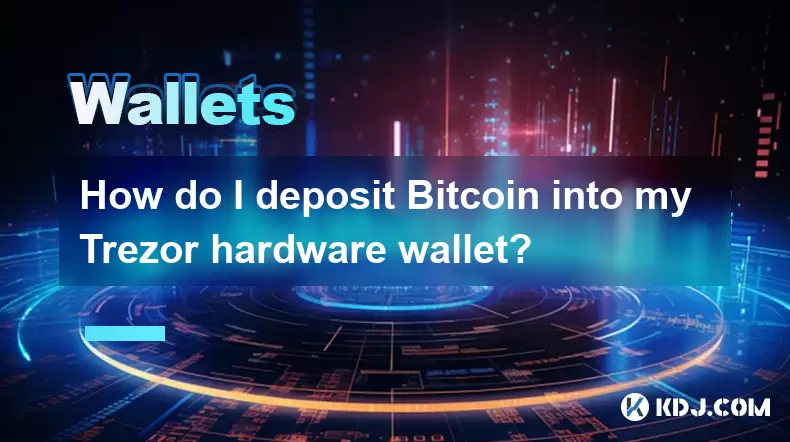
How do I deposit Bitcoin into my Trezor hardware wallet?
Jun 14,2025 at 12:29pm
What is a Trezor Hardware Wallet?A Trezor hardware wallet is a secure device designed to store cryptocurrencies offline, protecting them from online threats. Unlike software wallets, which are vulnerable to hacking and malware, Trezor stores private keys on the physical device itself. This ensures that transactions can only be approved by physically int...
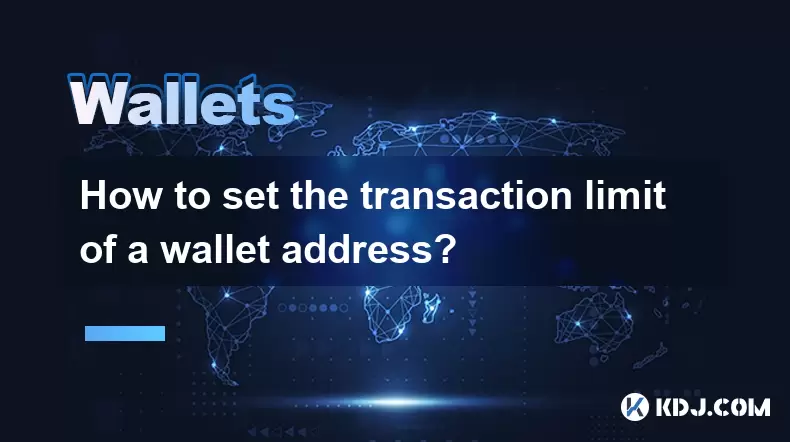
How to set the transaction limit of a wallet address?
Jun 16,2025 at 04:08am
Understanding the Concept of Transaction Limits in Cryptocurrency WalletsIn the cryptocurrency ecosystem, transaction limits refer to predefined restrictions placed on the amount of digital assets that can be sent or received by a wallet address within a specified timeframe. These limits are typically enforced by platforms such as exchanges, custodial w...
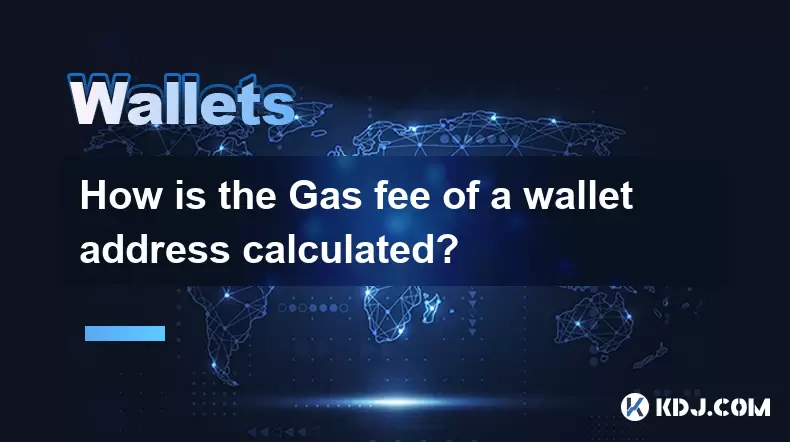
How is the Gas fee of a wallet address calculated?
Jun 14,2025 at 07:57pm
Understanding the Basics of Gas Fees in Blockchain TransactionsIn the cryptocurrency ecosystem, particularly within Ethereum-based networks, a Gas fee is an essential component of executing transactions or smart contract operations. The Gas fee serves as compensation for miners or validators who process and confirm transactions on the blockchain. It is ...

How do I transfer XRP to my Coinbase wallet?
Jun 16,2025 at 04:57pm
Understanding the Basics of XRP and Coinbase CompatibilityBefore initiating any transfer, it’s essential to confirm whether Coinbase supports XRP. As of recent updates, Coinbase has resumed offering XRP trading services on its platform after a period of uncertainty due to legal issues involving Ripple Labs. However, availability may vary depending on yo...

How do I deposit BNB into my Trust Wallet?
Jun 15,2025 at 03:56pm
Understanding BNB and Trust Wallet CompatibilityBefore initiating a deposit, it’s crucial to understand what BNB is and how it interacts with Trust Wallet. BNB (Binance Coin) is a utility token created by the Binance exchange. It can be used for paying transaction fees, participating in token sales, and more. Trust Wallet, on the other hand, is a mobile...

How do I send USDT to my Ledger Nano X?
Jun 15,2025 at 06:28am
What is USDT and Why Use Ledger Nano X?USDT, also known as Tether, is one of the most widely used stablecoins in the cryptocurrency ecosystem. It operates on various blockchain networks such as Ethereum (ERC-20), Tron (TRC-20), and others, offering users a digital asset pegged 1:1 to the US dollar. When it comes to storing USDT securely, hardware wallet...

How do I deposit Bitcoin into my Trezor hardware wallet?
Jun 14,2025 at 12:29pm
What is a Trezor Hardware Wallet?A Trezor hardware wallet is a secure device designed to store cryptocurrencies offline, protecting them from online threats. Unlike software wallets, which are vulnerable to hacking and malware, Trezor stores private keys on the physical device itself. This ensures that transactions can only be approved by physically int...

How to set the transaction limit of a wallet address?
Jun 16,2025 at 04:08am
Understanding the Concept of Transaction Limits in Cryptocurrency WalletsIn the cryptocurrency ecosystem, transaction limits refer to predefined restrictions placed on the amount of digital assets that can be sent or received by a wallet address within a specified timeframe. These limits are typically enforced by platforms such as exchanges, custodial w...

How is the Gas fee of a wallet address calculated?
Jun 14,2025 at 07:57pm
Understanding the Basics of Gas Fees in Blockchain TransactionsIn the cryptocurrency ecosystem, particularly within Ethereum-based networks, a Gas fee is an essential component of executing transactions or smart contract operations. The Gas fee serves as compensation for miners or validators who process and confirm transactions on the blockchain. It is ...
See all articles

























































































